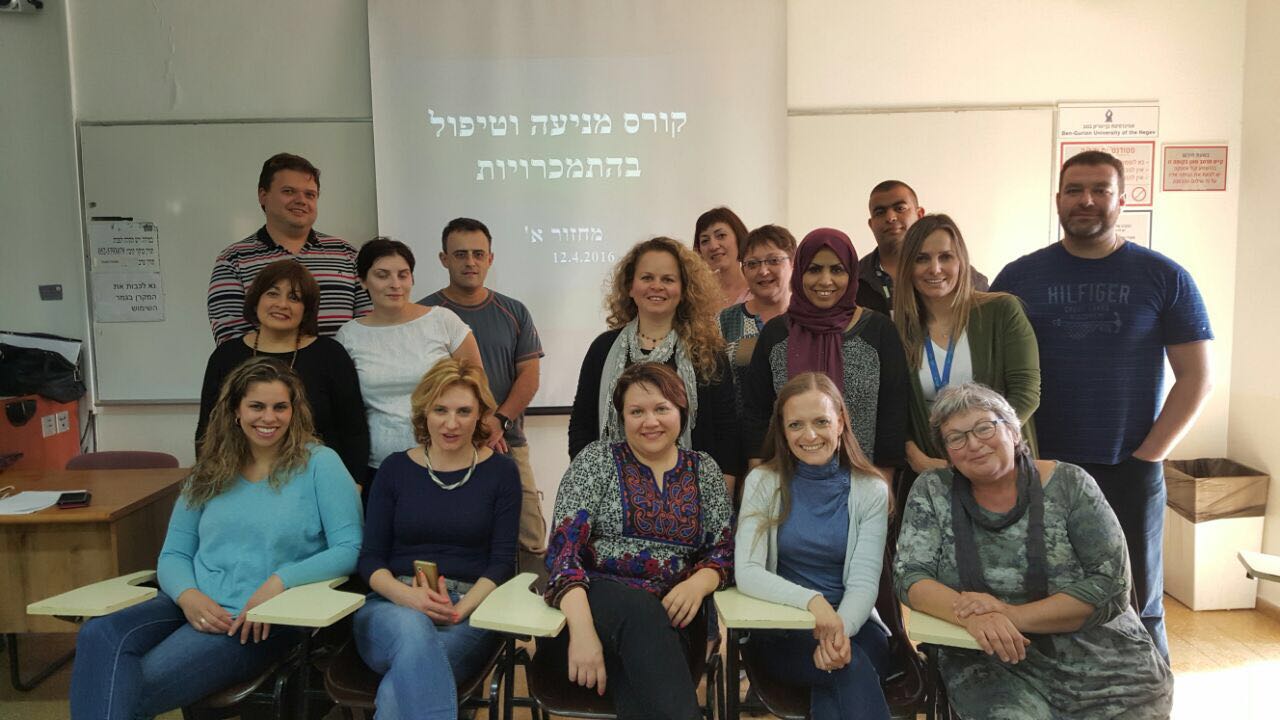The Toby Mower Curriculum for the Prevention and Treatment of Addiction recently concluded a three month long course “Addictions - Prevention, Detection and Treatment” for nurses who work in primary care clinics, Soroka University Medical Center and Beer-Sheva Mental Health Center.
The course included reference to various drug, alcohol and behavioral addictions. During those three months, the students were exposed to the various types of drugs; how they work; why they lead to addiction; the consequences of addiction on the individual, the family and society at large; legal views; and methods of treatment and prevention. The course included workshops and simulations and an experiential component to give the students more hands-on experience. The participants went to visit various centers such as rehabilitation centers, rehabilitation communities, Methadone Treatment Centers, and attended 12-step meetings.
“The feedback was excellent!” says Ms. Miriyam Farkash, RN, MA, incumbent of the Toby Mower Presidential Development Chair in Addiction Prevention and Treatment, “The 15 course participants said that this course completely changed the way they view the problem of addiction and enriched them with knowledge and motivated them to develop and change the way in which addictions are discussed and treated in their work places.”
“For example,” she continued, “intensive care unit nurses said they now realize that the way in which the patients are weaned off the psychotropic medication they receive during their hospitalization needs improvement and they intend to alter this process. Community nurses talked about increasing the services for spouses and families of patients struggling with addictions. They also talked about the fact that they see themselves as ambassadors with regard to their responsibility to advise their patients on issues related to addictions and also through encouraging colleagues to attend courses at the Toby Mower Curriculum.”
The generous support of Dr. Toby and Morton Mower enabled BGU to embark on an ambitious undertaking to develop the Toby Mower Curriculum for the Prevention and Treatment of Addiction, a new multi-disciplinary program in addiction, in 2011. The program set out to train nurses and other community health professionals in addressing addictive disorders including: alcohol and drug dependencies, nicotine dependencies, eating disorders, co-occurring disorders, and impulse-control disorders, by focusing on the prevention, intervention, treatment, and management of substance abuse and misuse.
The program is unique in Israel, where educational resources on topics related to addiction are often limited, piecemeal, and not well-integrated into clinical practice. In contrast, the Toby Mower Curriculum has been far reaching, already directly touching university students (undergraduate and graduate students), professionals in the field (nurses, medical students and others), educators (faculty and instructors from BGU’s Department of Nursing, as well as others in the Faculty of Health Sciences), and, most importantly, individuals suffering from addiction.
Farkash is a senior lecturer in BGU’s Leon and Mathilde Recanati School for Community Health Professions and coordinator of the community health nursing academic program, where she teaches theoretical and clinical instruction at the undergraduate and graduate levels. She teaches the Toby Mower Curriculum courses Introduction to Drug and Alcohol Abuse: Prevention and Treatment in Israel and The Diagnosis and Treatment of Behavioral Addictions, conducts research and supervises students.
Farkash was recently invited to become an International Society of Addiction Medicine (ISAM) Ambassador after participating in their conference last year in Scotland.
The role of an ISAM Ambassador is to act as a role model to encourage other addiction medicine specialists to be involved in the international and European strategic, training and educational addiction medicine field. This not only adds value to local and national efforts but provides a unique opportunity to support and sustain the profession of addiction medicine.

